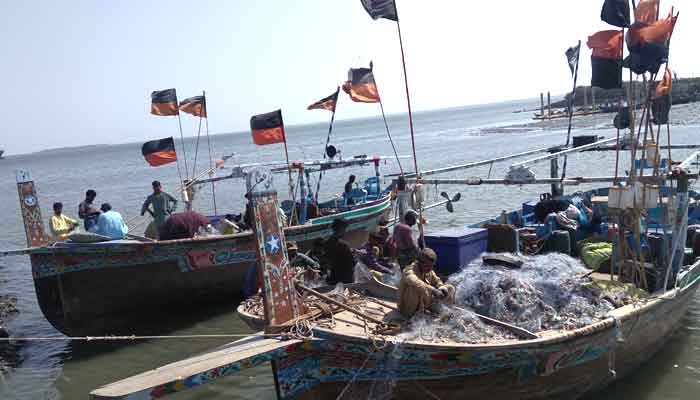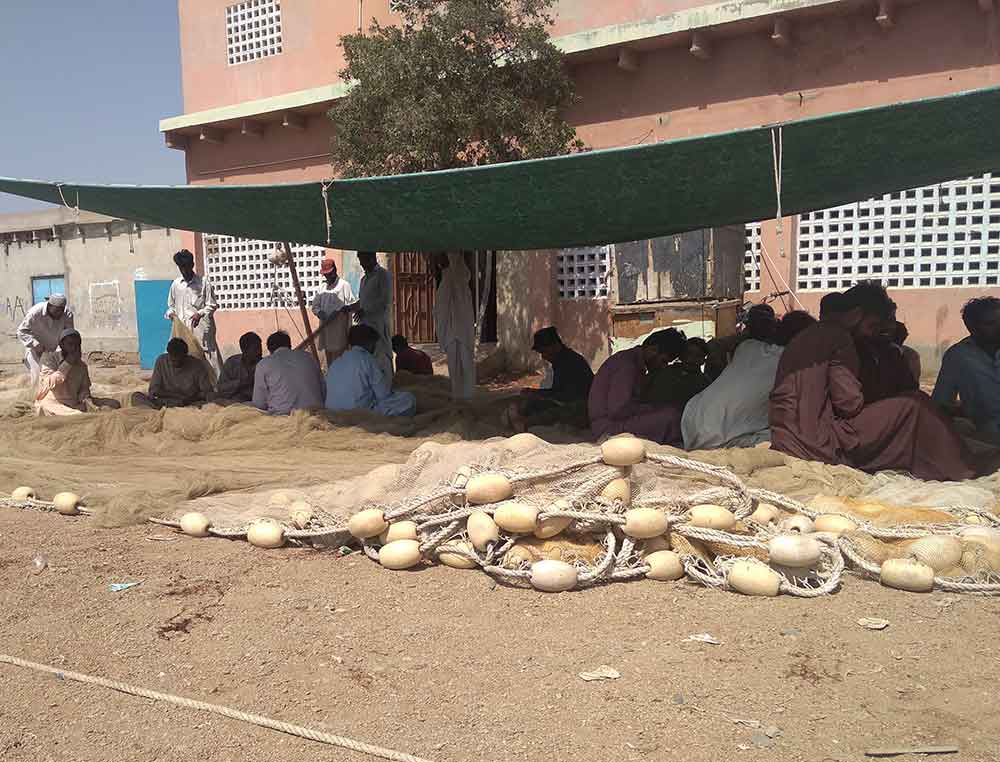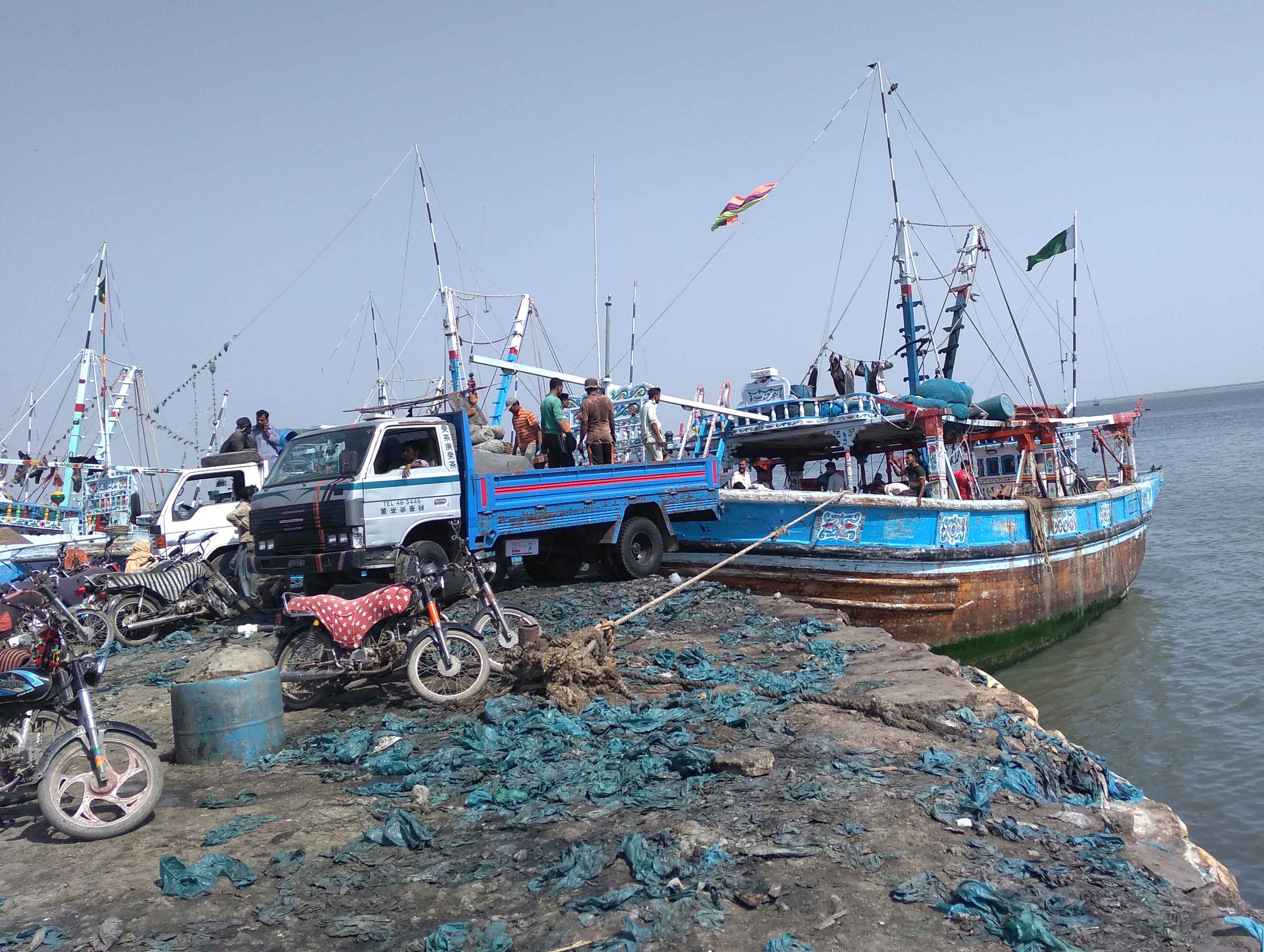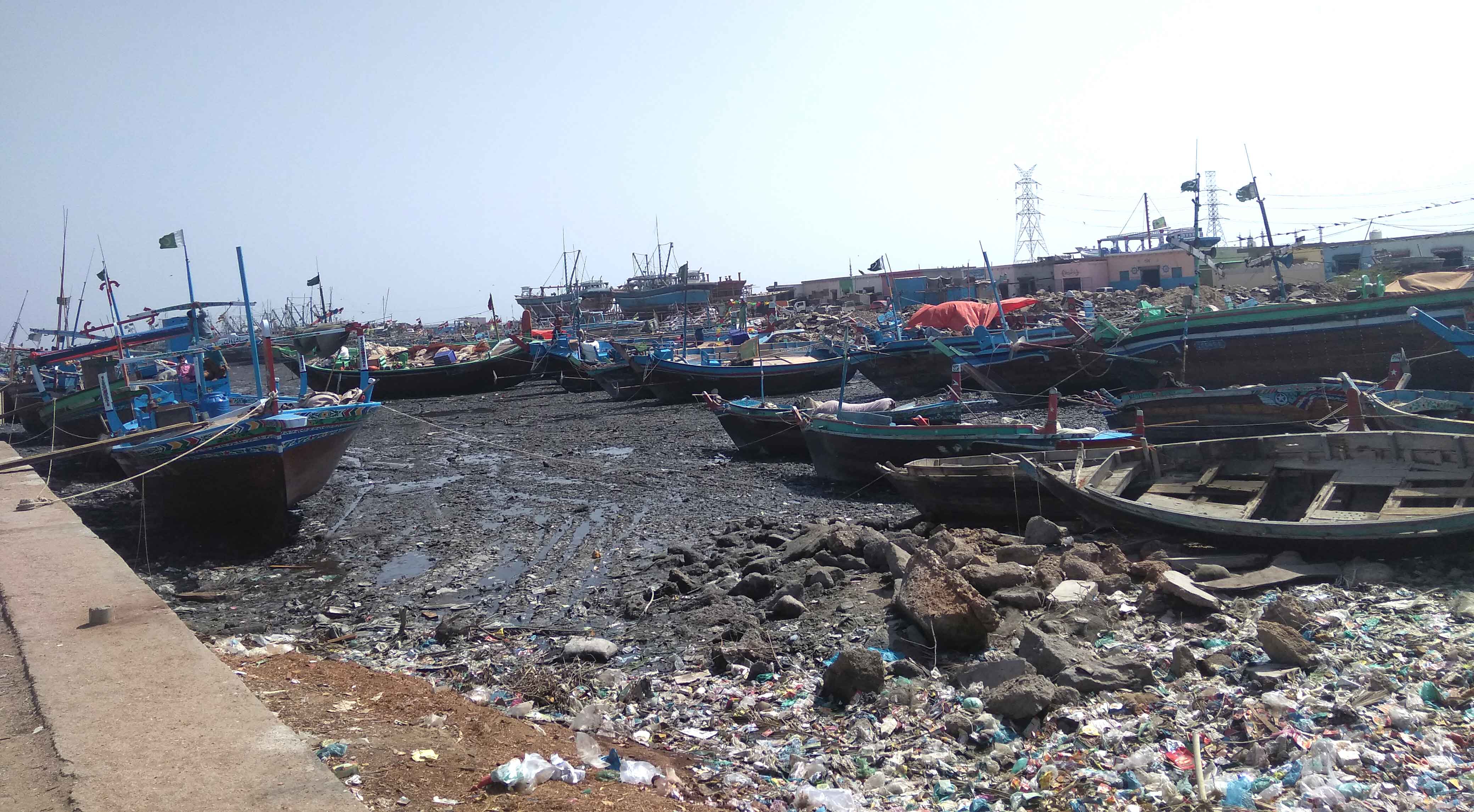Fishing communities are caught in the net of changing times
Some small wooden fishing boats are tied up at the wharf on the outskirts of Ibrahim Hyderi, one of the oldest fisherfolk settlements in Karachi’s coastal area. A group of fishermen is sitting on the beach near the dock, with only a green awning protecting them from the sun.
They’re stitching up worn-out fishing nets for their next trip at sea. The way they’re working at untangling the nets makes them look like they’re trying to free their lives that are caught in them. Whether their lives are trapped or not, their boat certainly is wedged in the treacherous mud.
Every now and again the quiet on the beach is broken by their leader and helmsman Muhammad Kafwani when he instructs them how to carefully repair the nets. The 45-year-old himself appears calm because he knows they can’t leave for the sea until there’s enough water to move their boat.
He’s resigned to never seeing those days again when the coastal areas of the Arabian Sea teemed with fishes and they managed some good hauls. But the state of their old boat and much smaller fishing nets are an example of what they’ve been reduced to.
Dying profession
Kafwani comes from a long line of fisherfolk. The days of living a simple yet prosperous life in Ibrahim Hyderi, however, are gone now. He’s seriously thinking of abandoning the profession because of privatisation. He fears that big investors will cause serious financial problems for the fishing communities.
“Owing to major investments, traditional fishing is no more a profitable profession, especially for the local fisherfolk,” said Kafwani. “Big vessels are replacing smaller boats, which will further affect our livelihood.”
Like many other fisherfolk in the locality, he’s trying hard to educate his children so they won’t have to go into the family profession. “When the authorities constructed barrages and dams on the rivers, they also destroyed the Indus delta, unaware of the consequences of water flow diversion.”
Resultantly, he said, agriculture vanished from the area. Later, he added, all the delta inhabitants started fishing, but now it seems that this profession is also dying.
Overfishing
Pakistan Fisherfolk Forum (PFF) Karachi President Abdul Majeed Motani pointed out that privatisation is not the only reason affecting the fishing communities: owners of big vessels are responsible for overfishing and bringing fisherfolk to the verge of poverty, as they can’t compete with the wealthy.
“They [the wealthy] use big motorised craft costing millions of rupees, while the fishing communities have only small boats. They can barely afford a 24-hour trip.”
Motani said that there used to be a time when the fisherfolk went out three to four nautical miles and returned with 500 to 800 kilograms of fishes. “Now we go out tens of nautical miles and spend a minimum of 24 hours at sea, spending more money but often returning without a good haul.”
Servants
Motani believes that one of the major factors behind decreasing fish stocks is that other communities, which have no relevant background, have entered the profession. He said that previously, people from only the Sindhi, Baloch, Kutchhi and Bengali communities were associated with the profession. But over the past few decades, people from other communities have also joined this line of work, he added.
“The latter ones don’t even know how, when and how much fishing should be carried out. But since they have made huge investments, their only aim is to make more and more money. And so the former have just become their servants.”
Negligence
Motani also pointed out the negligence of the relevant authorities: the Mercantile Marine Department doesn’t keep a check on the registration of ships, as anyone can get dozens of vessels registered by paying a fee between Rs600 and Rs6,000. But, he said, the fisherfolk don’t have the means to buy expensive craft.
Similarly, he added, sea contamination is also aggravating the plight of the fisherfolk: the areas they use for netting are riddled with wastewater from factories, the city’s untreated sewage and discarded plastic bags.
He said that these are among the key factors behind the depletion of fish stocks in nearby coastal areas, while the authorities keep detaining the fisherfolk over illegal fishing.
He lamented that even though the PFF has been demanding for years that the authorities should ensure the implementation of the relevant laws and the protection of the fisherfolk’s rights, these demands keep falling on deaf ears.
Devolution
PFF Central General Secretary Saeed Baloch said the fisheries sector is a part of the tax-exempt agriculture sector. And, he added, the federal government hasn’t devolved the relevant powers to the Sindh government, making it easier for the wealthy to make huge investments in the fisheries sector.
Baloch said that the government’s invitation to foreign companies to catch export-quality fishes opened the doors on competition between the locals and foreigners. “In a way they’re all destroying marine life. But it’s only the fishing communities that are losing their sole livelihood.”
Exploitation
Fisherman Muslim Mullani rejected the impression that privatisation of the fishing sector has created more job opportunities: it’s only worsening the miseries of the coastal communities with every passing day.
The 52-year-old said that members of the fishing communities are less educated, and that most of them don’t have any other skills, so unchecked commercialism will increase unemployment.
Mullani earns between Rs15,000 and Rs18,000 a month, but half of it is spent on keeping his boat running at sea. “Anyone can enter the profession, but they should never forget about the fishing communities that once flourished in the coastal belt.”
He also pointed out a couple of pressing issues: “In exchange for letting the fisherfolk borrow money from them, some lenders buy a large part of their catch at very low prices. And they deduct commission on the loans in the name of partnership.”
He said that such an exploitative practice forces the fisherfolk to surrender to the wealthy, adding that majority of the fisherfolk also don’t have property rights. “After returning from fishing, the boat owners charge us between Rs500 and Rs1,000 as well as take a part of our catch.”
Mullani said that if the government were to grant the fisherfolk small-scale loans, they’d be able to survive. They would also get legal access to fishing grounds, which would boost their earnings, he added.
Licences
After the 18th amendment, the Sindh and Balochistan governments reserve the right to access up to 20 nautical miles, and they also have the right to issue fishing licences.
Beyond this limit, up to 200 nautical miles is an exclusive economic zone that the federal government can explore and from which it can make use of the marine resources, including energy production from water and wind.
Recently, however, Sindh Livestock & Fisheries Minister Abdul Bari Pitafi announced that his department is also able to issue licences for deep sea fishing. But the federal government continues to issue licences for deep sea fishing and tenders pertaining to Sindh’s fisheries monitoring system.
-
 AI Copyright Battle: ByteDance To Curb Seedance 2.0 Amid Disney Lawsuit Warning
AI Copyright Battle: ByteDance To Curb Seedance 2.0 Amid Disney Lawsuit Warning -
 Savannah Guthrie In Tears As She Makes Desperate Plea To Mom's Kidnappers
Savannah Guthrie In Tears As She Makes Desperate Plea To Mom's Kidnappers -
 Canada’s Defence Industrial Strategy Targets 125,000 Jobs And Export Growth
Canada’s Defence Industrial Strategy Targets 125,000 Jobs And Export Growth -
 Tre Johnson, Former NFL Guard And Teacher, Passes Away At 54
Tre Johnson, Former NFL Guard And Teacher, Passes Away At 54 -
 Jerome Tang Calls Out Team After Embarrassing Home Defeat
Jerome Tang Calls Out Team After Embarrassing Home Defeat -
 Cynthia Erivo Addresses Bizarre Rumour About Her Relationship With Ariana Grande
Cynthia Erivo Addresses Bizarre Rumour About Her Relationship With Ariana Grande -
 Prince Harry, Meghan Markle Spotted Cosying Up At NBA All-Star Game
Prince Harry, Meghan Markle Spotted Cosying Up At NBA All-Star Game -
 Lady Gaga Explains How Fibromyalgia Lets Her 'connect With People Who Have It'
Lady Gaga Explains How Fibromyalgia Lets Her 'connect With People Who Have It' -
 Metro Detroit Weather Forecast: Is The Polar Vortex Coming Back?
Metro Detroit Weather Forecast: Is The Polar Vortex Coming Back? -
 Daniel Radcliffe Reveals Surprising Way Fatherhood Changed Him
Daniel Radcliffe Reveals Surprising Way Fatherhood Changed Him -
 ‘Disgraced’ Andrew At Risk Of Breaking Point As Epstein Scandal Continues
‘Disgraced’ Andrew At Risk Of Breaking Point As Epstein Scandal Continues -
 Alan Cumming Shares Plans With 2026 Bafta Film Awards
Alan Cumming Shares Plans With 2026 Bafta Film Awards -
 OpenClaw Founder Peter Steinberger Hired By OpenAI As AI Agent Race Heats Up
OpenClaw Founder Peter Steinberger Hired By OpenAI As AI Agent Race Heats Up -
 Kate Middleton's Reaction To Harry Stepping Back From Royal Duties Laid Bare
Kate Middleton's Reaction To Harry Stepping Back From Royal Duties Laid Bare -
 Rose Byrne Continues Winning Streak After Golden Globe Awards Victory
Rose Byrne Continues Winning Streak After Golden Globe Awards Victory -
 Ice Hockey Olympics Update: Canada Stays Unbeaten With Dominant Win Over France
Ice Hockey Olympics Update: Canada Stays Unbeaten With Dominant Win Over France







